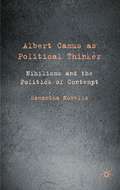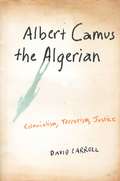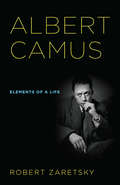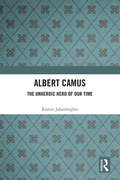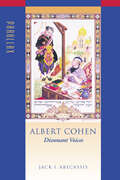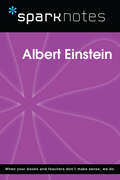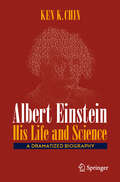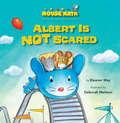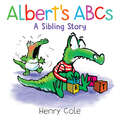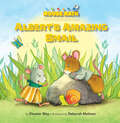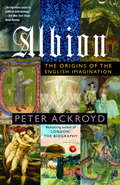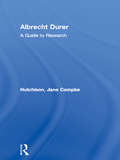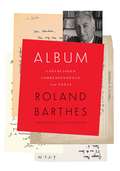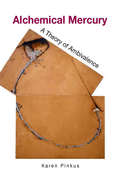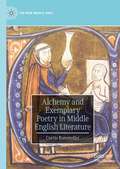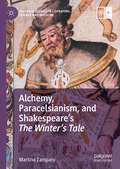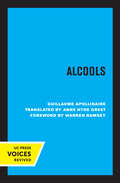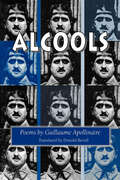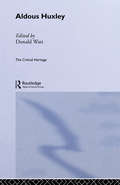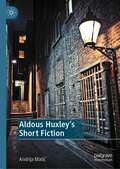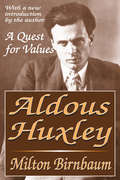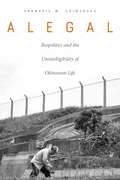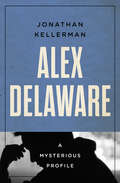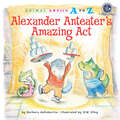- Table View
- List View
Albert Camus as Political Thinker
by Samantha NovelloAn intense genealogical reconstruction of Camus's political thinking challenging the philosophical import of his writings as providing an alternative, aesthetic understanding of politics, political action and freedom outside and against the nihilistic categories of modern political philosophy and the contemporary politics of contempt and terrorisms
Albert Camus the Algerian: Colonialism, Terrorism, Justice
by David CarrollIn these original readings of Albert Camus' novels, short stories, and political essays, David Carroll concentrates on Camus' conflicted relationship with his Algerian background and finds important critical insights into questions of justice, the effects of colonial oppression, and the deadly cycle of terrorism and counterterrorism that characterized the Algerian War and continues to surface in the devastation of postcolonial wars today. During France's "dirty war" in Algeria, Camus called for an end to the violence perpetrated against civilians by both France and the Algerian National Liberation Front (FLN) and supported the creation of a postcolonial, multicultural, and democratic Algeria. His position was rejected by most of his contemporaries on the Left and has, ironically, earned him the title of colonialist sympathizer as well as the scorn of important postcolonial critics. Carroll rescues Camus' work from such criticism by emphasizing the Algerian dimensions of his literary and philosophical texts and by highlighting in his novels and short stories his understanding of both the injustice of colonialism and the tragic nature of Algeria's struggle for independence. <P><P>By refusing to accept that the sacrifice of innocent human lives can ever be justified, even in the pursuit of noble political goals, and by rejecting simple, ideological binaries (West vs. East, Christian vs. Muslim, "us" vs. "them," good vs. evil), Camus' work offers an alternative to the stark choices that characterized his troubled times and continue to define our own. "What they didn't like, was the Algerian, in him," Camus wrote of his fictional double in The First Man. Not only should "the Algerian" in Camus be "liked," Carroll argues, but the Algerian dimensions of his literary and political texts constitute a crucial part of their continuing interest. Carroll's reading also shows why Camus' critical perspective has much to contribute to contemporary debates stemming from the global "war on terror."
Albert Camus: Elements of a Life
by Robert D. ZaretskyLike many others of my generation, I first read Camus in high school. I carried him in my backpack while traveling across Europe, I carried him into (and out of) relationships, and I carried him into (and out of) difficult periods of my life. More recently, I have carried him into university classes that I have taught, coming out of them with a renewed appreciation of his art. To be sure, my idea of Camus thirty years ago scarcely resembles my idea of him today. While my admiration and attachment to his writings remain as great as they were long ago, the reasons are more complicated and critical.—Robert Zaretsky On October 16, 1957, Albert Camus was dining in a small restaurant on Paris's Left Bank when a waiter approached him with news: the radio had just announced that Camus had won the Nobel Prize for Literature. Camus insisted that a mistake had been made and that others were far more deserving of the honor than he. Yet Camus was already recognized around the world as the voice of a generation—a status he had achieved with dizzying speed. He published his first novel, The Stranger, in 1942 and emerged from the war as the spokesperson for the Resistance and, although he consistently rejected the label, for existentialism. Subsequent works of fiction (including the novels The Plague and The Fall), philosophy (notably, The Myth of Sisyphus and The Rebel), drama, and social criticism secured his literary and intellectual reputation. And then on January 4, 1960, three years after accepting the Nobel Prize, he was killed in a car accident. In a book distinguished by clarity and passion, Robert Zaretsky considers why Albert Camus mattered in his own lifetime and continues to matter today, focusing on key moments that shaped Camus's development as a writer, a public intellectual, and a man. Each chapter is devoted to a specific event: Camus's visit to Kabylia in 1939 to report on the conditions of the local Berber tribes; his decision in 1945 to sign a petition to commute the death sentence of collaborationist writer Robert Brasillach; his famous quarrel with Jean-Paul Sartre in 1952 over the nature of communism; and his silence about the war in Algeria in 1956. Both engaged and engaging, Albert Camus: Elements of a Life is a searching companion to a profoundly moral and lucid writer whose works provide a guide for those perplexed by the absurdity of the human condition and the world's resistance to meaning.
Albert Camus: The Unheroic Hero of Our Time
by Ramin JahanbeglooThis book interprets the ideas, thoughts and concepts that characterize the writings and philosophy of Albert Camus for our contemporary times. It investigates Camus’ "revolted compassion" as an outsider and a philosopher-writer who in his own words believed in "creating dangerously". The author examines Camus’ interventions on political, philosophical and moral questions, such as Algerian independence, capital punishment, ideological violence, nihilism in the context of his ideals of the absurd and revolt, and justice and liberty. Further, it goes on to provide an exhaustive analysis of Camus’ critique of violence and his intellectual resistance to totalitarianism. Bringing together latest scholarship with an acute analysis of Albert Camus’ philosophy, this sourcebook throws a powerful light on the intellectual foundations of the twentieth century and its relevance for the twenty-first. The book will be of interest to scholars of literature, philosophy and African Studies.
Albert Cohen: Dissonant Voices (Parallax: Re-visions of Culture and Society)
by Jack I. AbecassisHonorable Mention winner in the Modern Language Association's Aldo and Jeanne Scaglione Prize competition for French and Francophone Literary StudiesA major figure in twentieth-century letters, Albert Cohen (1895–1981) left a paradoxical legacy. His heavily autobiographical, strikingly literary, and polyphonic novels and lyrical essays are widely read by a devout public in France, yet have been largely ignored by academia. A self-consciously Jewish writer and activist, Cohen remained nevertheless ambivalent about Judaism. His self-affirmation as a Jew in juxtaposition with his satirical use of anti-Semitic stereotypes still provokes unease in both republican France and institutional Judaism.In Albert Cohen: Dissonant Voices, the first English-language study of this profound and profoundly misunderstood writer, Jack I. Abecassis traces the recurrent themes of Cohen's works. He reveals the dissonant fractures marking Cohen as a modernist, and analyzes the resistance to his work as a symptom of the will not to understand Cohen's main theme—"the catastrophe of being Jewish."For Abecassis, Cohen's diverse oeuvre forms a single "roman fleuve" exploring this perturbing theme through fragmentation and grotesquerie, fantasies and nightmares, the veiling and unveiling of the unspeakable.Abecassis argues that Cohen should not be read exclusively through the prism of European literature (Stendhal, Tolstoy, Proust), but rather as the retelling—inverting and ultimately exhausting, in the form of submerged plots—of the Biblical romances of Joseph and Esther. The romance of the charismatic Court Jew and its performance correlative, the carnival of Purim, generate the logic of Cohen's acute psychological ambivalence, historical consciousness and carnal sensuality—themes which link this modernist author to Genesis as well as to the literary practices of Sephardic crypto-Jews. Abecassis argues that Cohen's best-known work, Belle du Seigneur (1968), besides being an obvious tale of obsessive love and dissolution, is foremost a tale of political intrigue involving Solal, the meteoric-rising Jew in the League of Nations during the period of Appeasement (1936), and his ultimate self-destruction. Providing close readings and imaginative analyses of the entire literary output of one of twentieth-century France's most important Jewish writers, Abecassis presents here a major work of literary scholarship, as well as a broader study of the reception and influence of Jewish thought in French literature and philosophy.
Albert Einstein (SparkNotes Biography Guide)
by SparkNotesAlbert Einstein (SparkNotes Biography Guide) Making the reading experience fun! SparkNotes Biography Guides examine the lives of historical luminaries, from Alexander the Great to Virginia Woolf. Each biography guide includes: An examination of the historical context in which the person lived A summary of the person&’s life and achievements A glossary of important terms, people, and events An in-depth look at the key epochs in the person&’s career Study questions and essay topics A review test Suggestions for further reading Whether you&’re a student of history or just a student cramming for a history exam, SparkNotes Biography guides are a reliable, thorough, and readable resource.
Albert Einstein – His Life and Science: A Dramatized Biography
by Ken K. ChinThis book is part biographical account, part novel, and part popular science. The basic facts are historically true, but many episodes have additionally been dramatized with plausible content that brings the personal story to life in the style of a novel or movie script. This genre of a “dramatized biography" of scientists was first created by the author 45 years ago and became a great success selling over half a million copies in China, where it has been in particular demand for teaching. But this is not the whole story: In addition, the book explains, in a serious yet accessible manner, the basics of Einstein’s scientific work, especially its impact on contemporary cosmology, astronomy, and physics. As an experienced teacher of relativity and astronomy for high-school and university students, the author knows how to make profound scientific subjects accessible, and his presentation is as fascinating as a detective story. Readers will learn not only about the historical setting but also about the challenges and frustrations faced by Einstein, about his breakthroughs and triumphs, as well as the far-reaching significance of his theory of relativity, quantum mechanics, and other scientific achievements. The reader will come to understand why, of all the billions of people living in the twentieth century, Albert Einstein was singled out as the “Person of the Century.”
Albert Is NOT Scared: Direction Words (Mouse Math)
by Eleanor MayEach read-aloud book in the Mouse Math series focuses on a single, basic math concept and features adorable mice, Albert and Wanda, who live in a People House. Entertaining fiction stories capture kids&’ imaginations as the mice learn about numbers, shapes, sizes and more. Over 3 million copies sold worldwide!It&’s Albert&’s first trip to the amousement park. He says he&’s not "afraid" to go on rides—he just doesn&’t like ones that go up and down. Or left and right. Or around and around! But what happens when Albert ends up in line for the wrong ride? Every Mouse Math title includes back matter activities that support and extend reading comprehension and math skills, plus free online activities. (Math concept: Direction Words)
Albert's ABCs: A Sibling Story
by Henry ColeOver the course of a day, big brother Albert manages his interactions with his little brother Baxter and the feelings that result, in this relatable romp through the alphabet.Big brother Albert gets increasingly frustrated with little brother Baxter. Crying! Diaper! Hungry! Irritated! A normal day and a familiar sibling interaction escalate alphabetically until Grandma resolves all the problems, with an X for a kiss goodnight, followed by Yawn, and, of course, ZZZZ.
Albert's Amazing Snail: Position Words (Mouse Math)
by Eleanor MayEach read-aloud book in the Mouse Math series focuses on a single, basic math concept and features adorable mice, Albert and Wanda, who live in a People House. Entertaining fiction stories capture kids&’ imaginations as the mice learn about numbers, shapes, sizes and more. Over 3 million copies sold worldwide!Albert loves his new pet snail! Flash is so smart, he can do any trick Albert teaches him…can't he? Every Mouse Math title includes back matter activities that support and extend reading comprehension and math skills, plus free online activities. (Math concept: Position Words)
Albion: Origins of the English Imagination
by Peter AckroydAn exciting new book from the acclaimed author of the magnificent London: The Biography. This book covers the whole of English cultural history from the Anglo-Saxon period to the present day -- from the Venerable Bede through English myths such as the legends about King Arthur and Albion to C. S. Lewis; from Chaucer through Spencer to George Eliot; from the English mystics through the philosopher Locke to Iris Murdoch; from Purcell through Elgar to Michael Tippett; from Hogarth through Constable to Turner; from mystery plays through Shakespeare to music hall. Peter Ackroyd's favourite themes are here: the visionary poetry of Blake, the theatrical novels of Dickens, the humanism of Thomas More -- and there are also explorations of forgery and plagiarism, Romanticism, artificiality, farce and pantomime, assimilation and energy. The author leads the reader through a labyrinth in one of the most exuberant books to be published this year.
Albrecht Durer: A Guide to Research (Artist Resource Manuals)
by Jane Campbell HutchisonHutchison's book is a complete guide on Durer and the research on his work, his historical import and his aesthetic legacy.
Album: Unpublished Correspondence and Texts (European Perspectives: A Series in Social Thought and Cultural Criticism)
by Roland BarthesAlbum provides an unparalleled look into Roland Barthes's life of letters. It presents a selection of correspondence, from his adolescence in the 1930s through the height of his career and up to the last years of his life, covering such topics as friendships, intellectual adventures, politics, and aesthetics. It offers an intimate look at Barthes's thought processes and the everyday reflection behind the composition of his works, as well as a rich archive of epistolary friendships, spanning half a century, among the leading intellectuals of the day.Barthes was one of the great observers of language and culture, and Album shows him in his element, immersed in heady French intellectual culture and the daily struggles to maintain a writing life. Barthes's correspondents include Maurice Blanchot, Michel Butor, Jacques Derrida, Michel Foucault, Julia Kristeva, Claude Lévi-Strauss, Georges Perec, Raymond Queneau, Alain Robbe-Grillet, Marthe Robert, and Jean Starobinski, among others. The book also features documents, letters, and postcards reproduced in facsimile; unpublished material; and notes and transcripts from his seminars. The first English-language publication of Barthes's letters, Album is a comprehensive testimony to one of the most influential critics and philosophers of the twentieth century and the world of letters in which he lived and breathed.
Alchemical Mercury: A Theory of Ambivalence
by Karen PinkusPinkus (Italian, French and comparative literature, University of Southern California) takes the reader on a somewhat quixotic journey through the many visions of alchemy from antiquity to the present. She points out that the derivation of the word is uncertain. But this is appropriate since the definition of alchemy is also murky. Is it science or magic? Is it something as crass as turning lead into gold, or as rarified as a spiritual rebirth? While alchemies have existed for centuries, Pinkus spends the most time on the alchemical centuries, roughly (for nothing is definite) 1500-1800. She finds alchemical thoughts in Goethe, Lavoisier, the Rosicrucians and Marx among many others. Her own philosophy, as expressed through the nebulous, contradictory attitudes of thinkers toward the concept of alchemy is given with intelligence and humor. Alchemy is a metaphor but its shifting meaning is the root of this exploration into ambivalence. Annotation ©2010 Book News, Inc. , Portland, OR (booknews. com)
Alchemy and Exemplary Poetry in Middle English Literature (The New Middle Ages)
by Curtis RunstedlerThis book explores the different functions and metaphorical concepts of alchemy in fourteenth- and fifteenth-century Middle English poetry and bridges them together with the exempla tradition in late medieval English literature. Such poetic narratives function as exemplary models which directly address the ambiguity of medieval English alchemical practice. This book examines the foundation of this relationship between alchemical narrative and exemplum in the poetry of Gower and Chaucer in the fourteenth century before exploring its diffusion in lesser-known anonymous poems and recipes in the fifteenth century, namely alchemical dialogues between Morienus and Merlin, Albertus Magnus and the Queen of Elves, and an alchemical version of John Lydgate’s poem The Churl and the Bird. It investigates how this exemplarity can be read as inherent to understanding poetic narratives containing alchemy, as well as enabling the reader to reassess the understanding and expectations of science and narrative within medieval English poetry.
Alchemy, Paracelsianism, and Shakespeare’s The Winter’s Tale (Palgrave Studies in Literature, Science and Medicine)
by Martina ZamparoThis book explores the role of alchemy, Paracelsianism, and Hermetic philosophy in one of Shakespeare’s last plays, The Winter’s Tale. A perusal of the vast literary and iconographic repertory of Renaissance alchemy reveals that this late play is imbued with several topoi, myths, and emblematic symbols coming from coeval alchemical, Paracelsian, and Hermetic sources. It also discusses the alchemical significance of water and time in the play’s circular and regenerative pattern and the healing role of women. All the major symbols of alchemy are present in Shakespeare’s play: the intertwined serpents of the caduceus, the chemical wedding, the filius philosophorum, and the so-called rex chymicus. This book also provides an in-depth survey of late Renaissance alchemy, Paracelsian medicine, and Hermetic culture in the Elizabethan and Jacobean ages. Importantly, it contends that The Winter’s Tale, in symbolically retracing the healing pattern of the rota alchemica and in emphasising the Hermetic principles of unity and concord, glorifies King James’s conciliatory attitude.
Alcools
by Guillaume ApollinaireThis title is part of UC Press's Voices Revived program, which commemorates University of California Press’s mission to seek out and cultivate the brightest minds and give them voice, reach, and impact. Drawing on a backlist dating to 1893, Voices Revived makes high-quality, peer-reviewed scholarship accessible once again using print-on-demand technology. This title was originally published in 1965.
Alcools: Poems (Wesleyan Poetry Series)
by Guillaume ApollinaireA new translation of this complex and beautiful poetry.Alcools, first published in 1913 and one of the few indispensable books of twentieth-century poetry, provides a key to the century's history and consciousness. Champion of &“cubism&”, Guillaume Apollinaire (1880-1918) fashions in verse the sonic equivalent of what Picasso accomplishes in his cubist works: simultaneity. Apollinaire has been so influential that without him there would have been no New York School of poetry and no Beat Movement. This new translation reveals his complex, beautiful, and wholly contemporary poetry. Printed with the original French on facing pages, this is the only version of this seminal work of French Modernism currently available in the United States.
Aldous Huxley
by Donald WattThis set comprises forty volumes covering nineteenth and twentieth century European and American authors. These volumes will be available as a complete set, mini boxed sets (by theme) or as individual volumes. This second set compliments the first sixty-eight volume set of Critical Heritage published by Routledge in October 1995.
Aldous Huxley
by Guinevera A. NanceCriticism and interpretation of Aldous Huxley's works, as well as an overview of his life.
Aldous Huxley's Short Fiction
by Andrija MatićAldous Huxley’s Short Fiction analyzes Huxley’s short stories within a modernist context, highlighting that he shared more characteristics with distinguished modernists than is usually believed. The book also explores other features of Huxley’s short stories, focusing on themes such as consumerism, mainstream education, shallow intellectualism, women’s emancipation, toxic masculinity, and sensational journalism, themes that correspond with both Huxley’s time and our world, and position him among the most prophetic authors of the twentieth century. This study demonstrates that Huxley’s short fiction can provide answers to questions that remain confusing or partially explained in the research on Huxley’s work. It illustrates the constants and changes in Huxley’s opinions on organized religion, mysticism, and the relation between sexuality and spirituality, while also clarifying Huxley’s political opinion, which is often misunderstood due to his advocacy of pacifism. Finally, the in-depth interpretations of Huxley’s short stories reveal the dynamics of his literary style, especially his complex humor and irony, areas he developed more than any other modernist author of short fiction.
Aldous Huxley: A Quest for Values
by Milton BirnbaumIn the moral vacuum and world of shifting values following World War I, Aldous Huxley was both a sensitive refl ector and an articulate catalyst. This work provides a highly illuminating analysis of Huxley's evolution from skeptic to mystic. As Milton Birnbaum shows, in a perceptive interpretation of Huxley's poetry, fi ction, essays and biographies-what evolved in Huxley's moral and intellectual pilgrimage was not so much a change in direction as a shift in emphasis. Even in the sardonic Huxley of the 1920s and 1930s, there is a moral concern. In the later Huxley, there are traces of the satirical skepticism which delighted his readers in the decades preceding World War II. A man of letters, a keen observer, seeker of new ways while profoundly knowledgeable in the truths of ancient wisdom, Huxley tried to achieve a symbiotic synthesis of the best of all worlds. In clarifying and interpreting Huxley's intellectual, moral, and philosophical development, Birnbaum touches upon all the subjects that came under the scrutiny of a singularly encyclopedic mind. This book is of great worth to those interested both in Huxley the brilliant satirist and in Huxley the seeker of salvation. In his search, Huxley typifi ed the modern quest for values. Milton Birnbaum's study is an invaluable guide in that journey. His new introduction takes account of research and analysis of Huxley that has occurred since this book's original publication.
Alegal: Biopolitics and the Unintelligibility of Okinawan Life
by Annmaria M. ShimabukuOkinawan life, at the crossroads of American militarism and Japanese capitalism, embodies a fundamental contradiction to the myth of the monoethnic state. Suspended in a state of exception, Okinawa has never been an official colony of the Japanese empire or the United States, nor has it ever been treated as an equal part of Japan. As a result, Okinawans live amid one of the densest concentrations of U.S. military bases in the world. By bringing Foucauldian biopolitics into conversation with Japanese Marxian theory, Alegal uncovers Japan’s determination to protect its middle class from the racialized sexual contact around its mainland bases by displacing them onto Okinawa, while simultaneously upholding Okinawa as a symbol of the infringement of Japanese sovereignty.This symbolism, however, has provoked ambivalence within Okinawa. In base towns that facilitated encounters between G.I.s and Okinawan women, the racial politics of the United States collided with the postcolonial politics of the Asia Pacific. Through close readings of poetry, reportage, film, and memoir on base-town life since 1945, Shimabuku traces a continuing failure to “become Japanese.” What she discerns instead is a complex politics surrounding sex work, tipping with volatility along the razor’s edge between insurgency and collaboration. At stake in sovereign powers’ attempt to secure Okinawa as a military fortress was the need to contain alegality itself—that is, a life force irreducible to the legal order. If biopolitics is the state’s attempt to monopolize life, then Alegal is a story about how borderland actors reclaimed its power for themselves.
Alex Delaware: A Mysterious Profile (Mysterious Profiles #8)
by Jonathan KellermanThe #1 New York Times–bestselling author discusses his early days as a writer and the creation of his beloved psychologist and sleuth.In 1985, clinical child psychologist Alex Delaware made his debut in the mystery novel When the Bough Breaks by Jonathan Kellerman. But how did Kellerman create a character who would go on to win him Edgar and Anthony Awards for best first novel and make him a number-one New York Times–bestselling author? Discover in this short read how Delaware and his friend and partner, police detective Milo Sturgis, came to be. Inside, Kellerman shares his initial struggles with the publishing world and the story behind his first success. He also details when he realized he had a series on his hands and how he developed his heroes into the characters who continue to delight millions of readers decades later.Praise for the Alex Delaware Novels“Startling . . . Charged with suspense. This one is simply too good to miss.” —Stephen King on Over the Edge“Harrowing . . . The work of a novelist of uncommon insight and storytelling skill.” —Los Angeles Times“High-powered . . . Alex Delaware is no ordinary psychologist. . . . He is also a born detective.” —The New York Times“An engrossing thriller. . . . This knockout of an entertainment is the kind of book which establishes a career in one stroke.” —Newsday on When the Bough Breaks
Alexander Anteater's Amazing Act (Animal Antics A to Z)
by Barbara deRubertisGet to know Alpha Betty&’s class in the award-winning, 26-book alphabet series ANIMAL ANTICS A TO Z! From Alexander Anteater to Zachary Zebra, it&’s one adventure after another. Zip along with these zany characters as they find new friends, test their talents, and have a rip-roaring good time! Alexander wants to have an amazing act for the talent show. He can already stand on his hands—but can his pals help make his act even more fantastic? This series is a perfect read-aloud choice to help kids discover the joy of letter sounds and give them the phonics building blocks they need for reading success. With delightful illustrations by Paddington Bear illustrator R.W. Alley, ANIMAL ANTICS A TO Z is an excellent resource for parents and educators alike. Activities in each book plus free activities online add to the fun.
